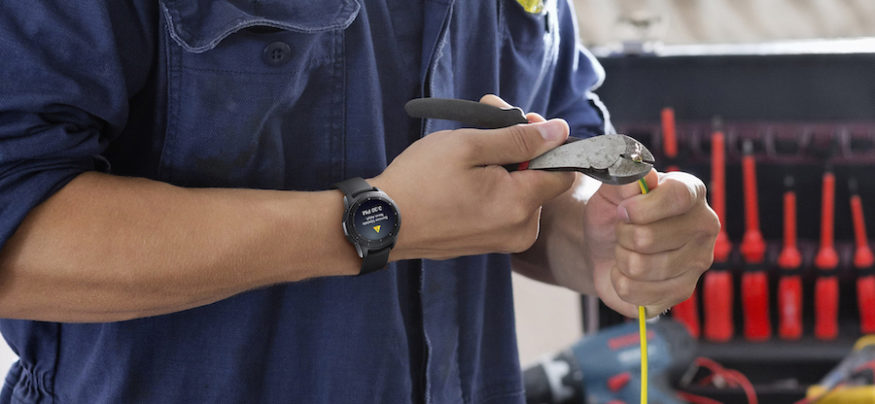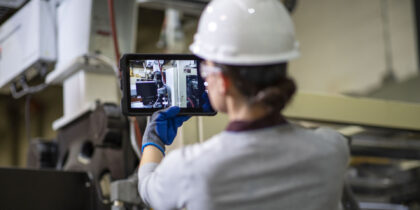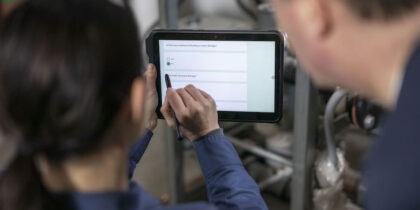The global footprint of many manufacturing companies, with plants spread out in countries around the world, makes compliance with mandatory regulations particularly challenging, especially as those regulations vary by geographies and often by industry.
It’s not enough for manufacturing companies alone to follow compliance requirements — their suppliers must check this box, too. This means compliance and audits affect all companies and vendors up and down the supply chain. But supply chains are also frequently scattered and add their own complications to the mix in terms of worker safety regulations.
The good news is that mobility delivers efficient ways of tackling this beast. As an essential pillar of technology in the smart factory, mobility simplifies the routine chores associated with compliance and ensures a safe digital “paper trail” for reference in routine audits.
Here are some potential bottlenecks in production processes that present challenges for manufacturing compliance and how mobile devices — paired with big data from the smart factory — can deliver efficiencies.
The Challenge of Different Geographies
Pinpointing compliance headaches for manufacturing plants spread across the globe can be dizzying. While regional and global manufacturing compliance requirements are frequently programmed into the manufacturing execution system (MES), a ready window into compliance issues might not always be available. Mobile devices not only aggregate that information across the manufacturing silos at various plants, they also deliver real-time data into compliance reports, thereby greatly simplifying manufacturing risk management.
The Challenge of a Paper Trail
Paper records of production work orders, system maintenance and repairs, and other routine tasks complicate the manufacturing compliance process. Employees have to update records manually — thereby increasing the chance of errors — and maintain multiple copies of records to ensure accessibility.
Modernize Your Factory With Mobile
Get your free guide to the mobile technologies that will accelerate your smart factory journey. Download Now
Mobility replaces the paper trail with a digital trail that provides workers an instant, real-time window into processes. Data generated from embedded devices can be programmed to auto-fill compliance documentation, and documents can be sent automatically to plant managers for digital signoff. In effect, mobility simplifies the data gathering process that is the backbone of audits, thereby greatly reducing risks of violation and penalties. The devices also reduce the time required to collect compliance data, while reducing data errors.
Smart factory manufacturing technology delivers additional volumes of data, but aggregating them on one platform and gathering meaningful analytics can be challenging. Silos between various pieces of equipment on the floor — even within the same company — can lead to gross inefficiencies in how compliance audits are carried out. Mobile devices help alleviate these challenges by allowing real-time access and transparency into all processes.
Authorized personnel can securely log into the MES through a proprietary portal on a mobile device such as the Samsung Tab Active2 or the Samsung Galaxy Note9 to zero in at a more granular level to identify and isolate manufacturing bottlenecks that might be sources of compliance headaches. Mobility makes data logging and cloud retrieval that much easier than having to rely on paper-based systems that are prone to manual errors and long-term environmental damage.
The Challenge of Worker Safety
In compliance and risk management, worker safety is generally the highest priority. The U.S. Occupational Safety and Health Administration (OSHA), for example, requires documentation that workers are protected against hazards such as electrical shock, chemical exposure and injury by industrial equipment. Manufacturers face extensive requirements to record inspection certifications and other safety documents and to document postings of employee safety materials.
Mobile devices accelerate documentation processes by enabling managers to record their safety procedures electronically in production areas and eliminate paper-based recordkeeping. Mobile devices can also facilitate training for specific manufacturing equipment on the plant floor. The worker securely logs in to a device and completes the necessary training, thereby decreasing the chances of straying from compliance requirements.
Manufacturers can also equip workers with wearable devices such as the Samsung Gear S3 in hazardous areas to monitor health and safety vitals continuously, and alert plant managers or field supervisors if a worker is in imminent danger.
Mobile devices help in the automation and storage of the “paper trail” needed to keep companies compliant. By improving transparencies up and down the digital supply network, going paperless, and pinpointing problems when they occur, mobile devices are necessary and indispensable allies for smart factories.
Learn more about using mobile technology to modernize your factory with our free white paper.








